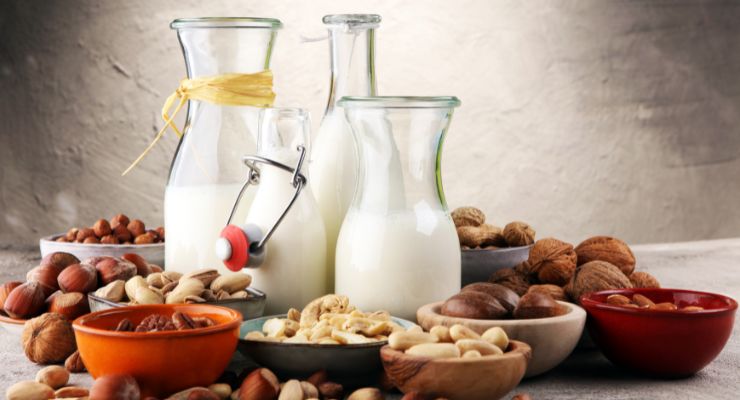12.12.23
A growing number of consumers are turning to dairy alternative products, opening opportunities to fortify plant-based dairy alternatives with key minerals, according to Michael Paikin, chief technologist of the Israel-based Gadot Biochemical Industries.
In Europe, between April 2022 and March 2023, there were 27 new oat-based ice cream launches, compared to only eight between April 2019 and March 2020. In America, oat-based dairy alternatives are also experiencing increased launches, with 34 launches compared to 17 launches in the same respective periods. While launches of almond and pea protein products are also strong, they haven’t been as robust.
Plant-based milk alternatives and foods offer consumers the taste and feel of milk, are sustainable, and are also more environmentally friendly by releasing less methane into the atmosphere. However, in the absence of fortification, these products contain less calcium than dairy.
“The rapidly increasing consumer awareness and demand for nutritionally enriched dairy alternatives creates a focus on nutrition content, notably minerals such as calcium and magnesium,” said Paikin.
Calcium contributes to bone health by filling in the collagen framework of bone tissue, increasing strength and density. It’s also important in muscle contraction and blood clotting.
Magnesium is evidenced to inhibit vascular calcification which can occur when high amounts of calcium are consumed regularly through both diet and supplementation.
“By adding calcium-complementary nutrients such as vitamin D and magnesium, a brand’s plant-based product will have a stronger appeal than counterparts that only contain calcium,” Paikin said. “However, it’s not as simple as just adding minerals into the plant-based formula for processing into the final product.”
Formulating Plant-Based Alternatives
There are three main formulation challenges to contend with when fortifying plant-based dairy alternatives with minerals.
The first is solubility and stability. Calcium and magnesium salts have varying solubility in plant-based milk, which can affect the stability and texture of the final product. Achieving a homogenous mixture without sedimentation or separation is a key challenge.
The next challenge is taste and mouthfeel. Adding minerals can alter the taste and mouthfeel of milk alternatives, by imparting a chalky or metallic taste which can be undesirable. Masking these flavors, while maintaining a natural milk flavor, is a significant challenge.
Lastly, the calcium and magnesium used must be bioavailable. Forms of these minerals vary in bioavailability, and choosing the right form is crucial for the end product’s nutritional value.
“Addressing these challenges requires a multi-disciplinary approach involving food scientists, nutritionists, and technologists to create a vegan milk product that is nutritious, palatable, stable, and economically viable,” Paikin said.
Gadot can provide mineral solutions for magnesium and calcium fortification, which can provide stable suspension and no sedimentation, without the need for additional stabilizers, Paikin said. Gadot, is approaching its 60th anniversary of creating highly bioavailable ingredients, and its portfolio includes magnesium, calcium, zinc, potassium, and sodium in a variety of forms like citrates, gluconates, and bisglycinates.
In Europe, between April 2022 and March 2023, there were 27 new oat-based ice cream launches, compared to only eight between April 2019 and March 2020. In America, oat-based dairy alternatives are also experiencing increased launches, with 34 launches compared to 17 launches in the same respective periods. While launches of almond and pea protein products are also strong, they haven’t been as robust.
Plant-based milk alternatives and foods offer consumers the taste and feel of milk, are sustainable, and are also more environmentally friendly by releasing less methane into the atmosphere. However, in the absence of fortification, these products contain less calcium than dairy.
“The rapidly increasing consumer awareness and demand for nutritionally enriched dairy alternatives creates a focus on nutrition content, notably minerals such as calcium and magnesium,” said Paikin.
Calcium contributes to bone health by filling in the collagen framework of bone tissue, increasing strength and density. It’s also important in muscle contraction and blood clotting.
Magnesium is evidenced to inhibit vascular calcification which can occur when high amounts of calcium are consumed regularly through both diet and supplementation.
“By adding calcium-complementary nutrients such as vitamin D and magnesium, a brand’s plant-based product will have a stronger appeal than counterparts that only contain calcium,” Paikin said. “However, it’s not as simple as just adding minerals into the plant-based formula for processing into the final product.”
Formulating Plant-Based Alternatives
There are three main formulation challenges to contend with when fortifying plant-based dairy alternatives with minerals.
The first is solubility and stability. Calcium and magnesium salts have varying solubility in plant-based milk, which can affect the stability and texture of the final product. Achieving a homogenous mixture without sedimentation or separation is a key challenge.
The next challenge is taste and mouthfeel. Adding minerals can alter the taste and mouthfeel of milk alternatives, by imparting a chalky or metallic taste which can be undesirable. Masking these flavors, while maintaining a natural milk flavor, is a significant challenge.
Lastly, the calcium and magnesium used must be bioavailable. Forms of these minerals vary in bioavailability, and choosing the right form is crucial for the end product’s nutritional value.
“Addressing these challenges requires a multi-disciplinary approach involving food scientists, nutritionists, and technologists to create a vegan milk product that is nutritious, palatable, stable, and economically viable,” Paikin said.
Gadot can provide mineral solutions for magnesium and calcium fortification, which can provide stable suspension and no sedimentation, without the need for additional stabilizers, Paikin said. Gadot, is approaching its 60th anniversary of creating highly bioavailable ingredients, and its portfolio includes magnesium, calcium, zinc, potassium, and sodium in a variety of forms like citrates, gluconates, and bisglycinates.




























